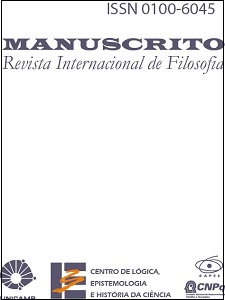Resumo
O objetivo desse artigo é realizar o que podemos chamar de uma análise conceitual da noção de indução, tomando como ponto de partida o problema das ambigüidades indutivas. Tentaremos mostrar que existe não apenas uma, mas duas maneiras igualmente autênticas de lidar com o problema das ambigüidades indutivas, e que quando certos aspectos lógicos dos dois conceitos de plausibilidade oriundos dessas duas abordagens da indução são considerados, muito da controvérsia a respeito das ambigüidades indutivas é dissolvido. Dentre tais aspectos está uma suposta relação entre essas duas noções indutivas de plausibilidade e os conceitos de paraconsistência e paracompletude. Nossa análise é materializada, por assim dizer, em uma lógica modal paraconsistente e paracompleta capaz de dar conta dos aspectos mais básicos dessas duas abordagens da indução bem como dos dois conceitos de plausibilidade delas oriundos. Na exemplificação do tipo de controvérsia o qual estamos nos referindo, bem como a solução que estamos propondo, nos detalharemos sobre uma das mais ilustres instâncias do problema das inconsistências indutivas: o paradoxo da loteria.
The purpose of this paper is to undertake a conceptual analysis of the notion of induction, taking as starting-point the problem of inductive ambiguities. We shall try to show that there is not only one, but two equally authentic ways of dealing with the problem of inductive ambiguities, and that when certain logical aspects of the two plausibility concepts that arise from these two approaches to induction are considered, much of the controversy about the inductive ambiguities disappears. Among such aspects is a relation that supposedly exists between these two notions of inductive plausibility and the concepts of paraconsistency and paracompleteness. Our analysis is materialized, so to speak, in a paraconsistent and paracomplete modal logic able to deal with the most basic aspects of these two approaches to induction. In exemplifying the kind of controversy we are talking about, as well as the solution we are proposing, we shall focus on one of the noblest instances of the problem of inductive inconsistencies: the lottery paradox.
Referências
ALLEN, J., FIKES, R., SANDEWALL, E. (eds.). Principles of Knowledge
Representation and Reasoning: Proceedings of Second International Conference. San Mateo: Morgan Kaufmann, 1991.
BAR-HILLEL, Y. (ed.). Logic, Methodology and Philosophy of Science: Proceedings of the 1964 International Congress. Amsterdam: North-Holland, 1964.
BATENS, D. “On the remarkable correspondence between paraconsistent
logics, modal Logics and ambiguity Logics”. In: W. Carnielli, M. Coniglio and I. D’Ottaviano (eds.) (2002), pp. 445-454.
BÉZIAU, J. “The future of paraconsistent logic”. Logical Studies, 2, pp. 1-
, 1999.
————. “S5 is a paraconsistent logic and so is first-order classical logic”. Logical Studies, 9, pp. 301-309, 2002.
————. “Paraconsistent logic from a modal viewpoint”. Journal of pplied
Logic, 3, pp. 7-14, 2005.
BUCHSBAUM, A., PEQUENO, T., PEQUENO, M. “A logical expression of reasoning”. Synthese, 154, pp. 431-466, 2007.
CARNAP, R. Logical Foundations of Probability. Chicago: University of Chicago Press, 1950.
CARNIELLI, W., CONIGLIO, M., D’OTTAVIANO, I. (eds.). Paraconsistency: The Logical Way to the Inconsistency. New York: Marcel Dekker, 2002.
COHEN, J. “Belief and acceptance”. Mind, 98, pp. 367-389, 1989.
DOSEN, K. “Negation as a modal operator”. Reports on Mathematical
Logic, 20, pp. 15-28, 1986.
FEIGL H., MAXWELL, G. (eds.). Minnesota Studies in the Philosophy of
Science, Vol. III: Scientific Explanation, Space and Time, Minneapolis:
Minnesota University Press, 1962.
FEYERABEND, P. “Explanation, reduction and empiricism”. In: H. Feigl and G. Maxwell (eds.) (1962), pp. 28-97.
GABBAY, D., HOGGER, D., ROBINSON, J. (eds.). Handbook of Logic in
Artificial Intelligence and Logic Programming, Vol. 3, Nonmonotonic Reasoning and Uncertain Reasoning. Oxford: Oxford University Press, 1994.

